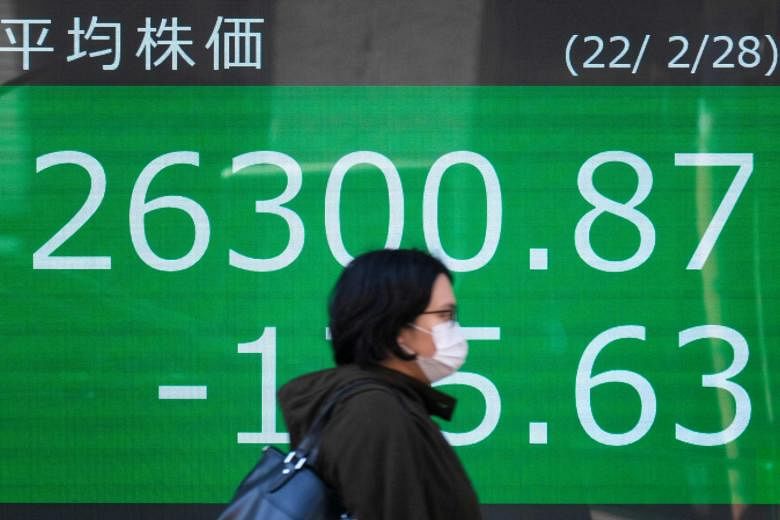BANGKOK (BLOOMBERG) - Knee-jerk losses in Asian stock markets moderated on Friday (March 4) as traders assessed the severity of the situation at a major nuclear power plant in Ukraine that came under attack by Russian troops.
S&P 500 Index futures were trading 0.6 per cent lower, after earlier falling 1.7 per cent. Gains in gold and the US dollar moderated as demand for haven assets eased.
Confirmation from regulators that radiation levels around the site are normal and reports that an initial fire was in an administrative building suggest a major disaster is not imminent, former Nato deputy secretary-general Rose Gottemoeller told Bloomberg Television in an interview.
“That does not in any way excuse the Russian troops for firing on this nuclear power plant facility and endangering not only Ukraine and the surrounding countries, but also really Russia itself should there be some kind of explosion,” Ms Gottemoeller said.
Singapore’s Straits Times Index was down 0.5 per cent at the midday break after sliding as much as 1.2 per cent earlier.
Japan’s Nikkei index fell 2.5 per cent, while South Korea’s Kospi index lost 1.2 per cent and Australia’s S&P/ASX 200 index dropped 0.9 per cent
Hong Kong’s Hang Seng index tumbled 2.7 per cent and China’s Shanghai Composite index shed 0.7 per cent.
Futures tied to the S&P 500 were down 0.8 per cent, after falling 1.3 per cent earlier.
Oil was near US$110 a barrel, trimming a jump of as much as 4.8 per cent.
Russian troops began shelling the facility - Europe’s largest nuclear plant - on Friday, Ukrainian officials said.
Sentiment was already shaky after Russia’s invasion of its neighbour and transformation into a pariah in the global economy. Energy, metal and grain costs have soared as Russia’s oil and other resources are shunned.
“The headlines about the Russian shelling of that nuclear plant are clearly driving a flight to quality trade,” said Mr Chamath De Silva, senior portfolio manager at BetaShares Holdings in Sydney.
Russia’s military action and sanctions imposed by the United States and its allies are creating a range of risks. They include high raw material costs, damage to global confidence that can sap investment and the potential for credit stress to ripple through markets.
The gap between two-year and 10-year US Treasury yields is the lowest since March 2020. The flatter curve points to expectations for slowing economic expansion.
“Rising commodity prices are a big concern for the market, prompting fears of stagflation,” said Ms Fiona Cincotta, senior financial markets analyst at City Index. “The economic clinch point of this war is commodity prices. Higher energy prices, slowing growth and surging inflation are not a good outlook.”
Traders are also evaluating the monetary policy outlook and awaiting a key monthly US employment report.
Federal Reserve chair Jerome Powell on Thursday reaffirmed that the Fed is set to start a series of interest rate hikes to curb inflation, while indicating that it will move judiciously and is alert to inflation risks.
Mr Powell, in testimony to lawmakers, said the Russian attack is leading to risks for inflation and growth. He again backed a quarter-point Fed rate hike later this month. He said the Fed is "prepared to raise by more than that" at one or more meetings if inflation does not come down.
Follow The Straits Times' live coverage on the Ukraine crisis here.

